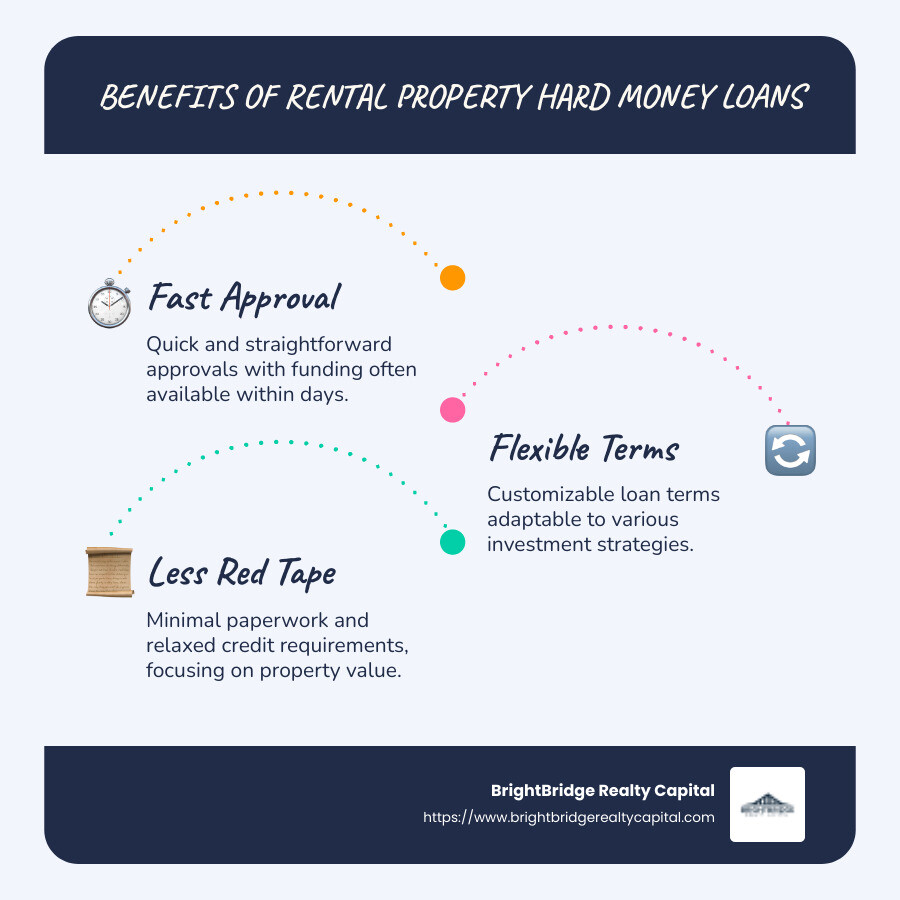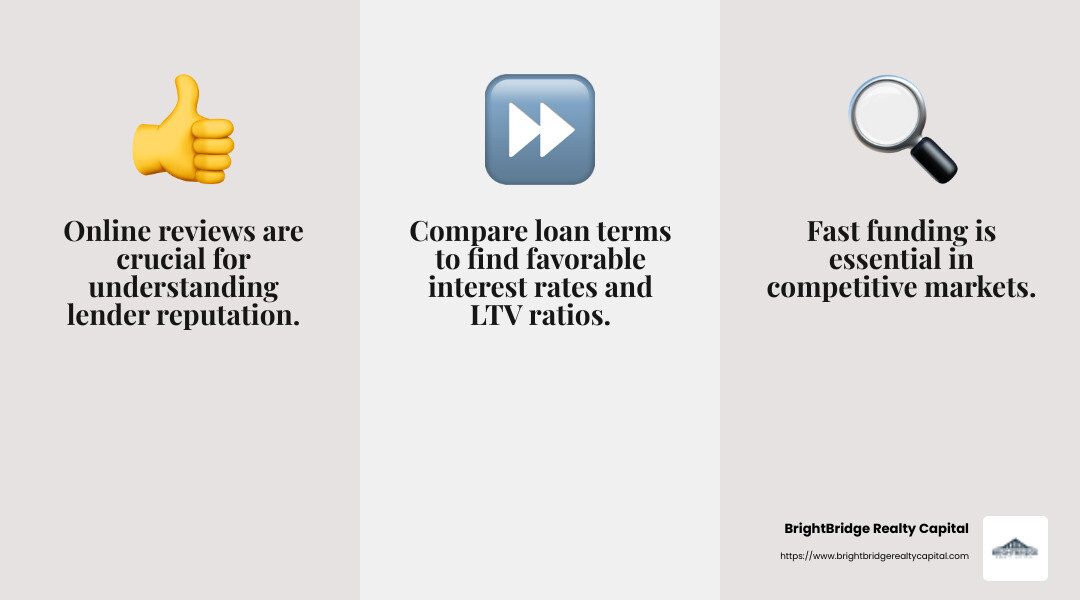Hard Money, Smart Moves: A Guide to Rental Property Loans

Rental property hard money loans offer a powerful financing option for investors seeking fast, flexible, and lower-barrier capital compared to traditional loans. These loans are particularly appealing for real estate investors who want to quickly seize opportunities in competitive markets. Here's what makes rental property hard money loans stand out:
- Fast Approval: Quick, straightforward approvals, often with funding in days.
- Flexible Terms: Adaptable to various investment strategies, with customizable loan terms.
- Less Red Tape: Minimal paperwork and relaxed credit requirements, focusing on property value.
Rental property hard money loans are increasingly becoming the go-to solution for investors aiming to transcend the limitations of conventional financing. By offering swift access to capital, they empower investors to capitalize on lucrative real estate opportunities without the lengthy processes involved with traditional bank loans. Whether you're a seasoned investor or just starting out, these loans can streamline your path to building a rental property portfolio.

Basic rental property hard money loans terms:
- creative financing for rental property
- how to finance a rental property with no money down
- low down payment rental property loans
Understanding Rental Property Hard Money Loans
Rental property hard money loans are a popular choice for real estate investors looking to move quickly in the market. These loans are short-term, typically ranging from 6 months to a few years, and are secured by the property itself. This means the property's value is a key factor in the loan approval process, rather than the borrower's credit score. Here's a deeper dive into the key features and pros and cons of these loans.
Key Features
Flexibility: Hard money loans offer flexible terms that can be custom to fit various investment strategies. Whether you're fixing and flipping or buying to rent, these loans can adapt to your needs.
Fast Funding: One of the biggest advantages of hard money loans is their speed. Unlike traditional loans, which can take weeks or even months to process, hard money loans can often be approved and funded within days. This quick turnaround is perfect for investors who need to act fast to secure a property.
Credit Score: While traditional loans rely heavily on the borrower's credit score, hard money loans place less emphasis on this. Instead, they focus more on the value of the property being purchased. This makes them accessible to investors who might not qualify for a conventional loan due to a lower credit score.
Pros and Cons
Pros
Quick Approval: The approval process for hard money loans is much faster than that of traditional loans. This allows investors to quickly seize opportunities and close deals in competitive markets.
Less Stringent Criteria: With less focus on credit scores and more on property value, these loans are accessible to a wider range of investors.
Cons
Higher Interest Rates: The convenience and speed of hard money loans come at a cost. Interest rates for these loans are generally higher than those of traditional loans. This is because private lenders take on more risk by not thoroughly vetting the borrower's creditworthiness.
Short-term Nature: While the short-term aspect of these loans can be a benefit, it can also be a drawback if the borrower is unable to repay or refinance the loan within the given timeframe.
Rental property hard money loans are a strategic tool for investors who need quick access to capital and are willing to pay a premium for the speed and flexibility they offer. By understanding these key features and weighing the pros and cons, investors can make informed decisions about whether hard money loans are the right fit for their real estate ventures.
Next, we'll explore how to effectively use hard money loans for rental properties, diving into investment strategies and comparing short-term versus long-term loans.
How to Use Hard Money Loans for Rental Properties
When it comes to using rental property hard money loans, investors have a variety of strategies at their disposal. Whether you're looking to quickly flip a property or hold it for rental income, understanding the nuances of these loans can help you make smart decisions.
Short-term vs Long-term Loans
Short-term loans are typically used for fix-and-flip projects. These loans usually last between 6 to 24 months. They are ideal for properties that need renovation before being sold at a profit. The quick turnaround is crucial here, as investors aim to repay the loan as soon as the property is sold.
Interest Rates: Short-term loans often have higher interest rates, usually between 6% and 8%. This is due to the increased risk and short repayment period.
Repayment Terms: These loans often require interest-only payments during the term, with a balloon payment due at the end. This structure allows investors to manage cash flow while focusing on property improvements.
Long-term loans, on the other hand, are more suited for buy-to-rent strategies. These loans can span 15 to 30 years, offering lower monthly payments and stable interest rates. They are beneficial for investors planning to hold onto properties to generate ongoing rental income.
Interest Rates: Generally lower than short-term loans, making them more affordable over time.
Repayment Terms: Long-term loans typically have fixed monthly payments, which can help with budgeting and financial planning.
Loan-to-Value (LTV) Ratios
LTV ratios are crucial when it comes to hard money loans. They determine how much of the property’s value can be financed through the loan.
80% LTV: This is a common ratio for hard money loans. It means the lender will finance up to 80% of the property's value. You'll need to cover the remaining 20% as a down payment. This is safer for lenders and requires investors to have some skin in the game.
90% LTV: Some lenders offer higher LTV ratios, up to 90%. This allows investors to borrow more against the property's value, reducing the upfront cash needed. However, these loans may come with stricter terms or higher interest rates.
ARV Considerations: For fix-and-flip projects, the After Repair Value (ARV) is a critical factor. Lenders may base the loan amount on the estimated value of the property after renovations. This can be advantageous for investors, as it allows them to leverage the potential increase in property value.
Choosing the right loan type and understanding LTV ratios are key steps in leveraging hard money loans effectively. By aligning your choice with your investment strategy, you can maximize the benefits while minimizing risks.
Next, we'll dig into finding the right hard money lender, exploring how reputation, funding speed, and loan terms can impact your investment journey.
Finding the Right Hard Money Lender
Choosing the right hard money lender is a critical step in your investment journey. The lender you select can significantly impact the success of your rental property investment. Let's explore how to evaluate potential lenders based on key factors like reputation, funding speed, and loan terms.
Evaluating Lenders
Reputation:
A lender's reputation is paramount. Start by checking online reviews and testimonials from previous borrowers. This can give you insights into the lender's reliability and customer service. Look for lenders with more positive reviews than negative ones. You might also want to connect with other real estate professionals who have experience with hard money lenders. They can provide accounts of their experiences.
Funding Speed:
The speed at which a lender can fund your loan is crucial, especially in competitive markets where time is of the essence. Hard money loans are known for their quick approval and funding processes, but this can vary among lenders. Some lenders can provide funding within a week, which can be a game-changer for investors looking to seize opportunities quickly.
Loan Terms:
Carefully compare the loan terms offered by different lenders. This includes the interest rates, loan duration, and any fees involved. Hard money loans typically have higher interest rates compared to traditional loans, so finding the most favorable terms is essential. Pay attention to the loan-to-value (LTV) ratios offered, which can affect how much you need to invest upfront.
Online Reviews and Real Estate Connections:
Use online platforms and real estate networks to gather information about potential lenders. Social media can be a surprising source of recommendations and reviews. Additionally, joining real estate investor clubs can be beneficial. These clubs often have members who can recommend reputable lenders or even have lenders present at meetings to network with potential clients.

Investor Clubs:
Real estate investor clubs are valuable resources for networking and finding trustworthy lenders. These clubs provide a platform where investors share their experiences and recommendations. Attending meetings or events organized by these clubs can help you connect with lenders who have a good track record.
By evaluating lenders based on these factors, you can make an informed decision that aligns with your investment strategy. The right lender will not only provide the necessary funds but also offer terms that support your financial goals.
Next, we'll address some frequently asked questions about rental property hard money loans, including down payment requirements and typical loan terms.
Frequently Asked Questions about Rental Property Hard Money Loans
Do Hard Money Loans Require a Down Payment?
Down Payment Options:
Hard money loans often don't require a traditional down payment like bank loans do. Instead, they focus on the property's value and potential. However, some lenders may still ask for a small down payment to reduce their risk. The amount varies, but it's usually less than what banks require.
Financing Strategies:
If a down payment is needed, consider using a business line of credit or personal savings. Some investors use funds from other properties they own. This flexibility can be a big advantage when using rental property hard money loans.
Can You Get 100% Financing?
ARV Limits:
Getting 100% financing is possible but challenging. Lenders look at the After Repair Value (ARV) of the property. To qualify, your total loan amount, including purchase and repair costs, should be less than 70% of the ARV. This means the property must have significant potential value after improvements.
Credit Score Impact:
While hard money lenders focus more on the property than the borrower's credit, a solid credit score can help. It may not guarantee 100% financing, but it can improve your chances. Experience in property investment, like flipping houses, can also be beneficial.
What Are the Typical Loan Terms?
Interest Rates:
Hard money loans have higher interest rates than traditional loans. Rates can range from 10% to 18%. This is because these loans are riskier for lenders. However, the quick approval and funding speed often make the higher rates worthwhile for investors.
Loan Duration:
These loans are usually short-term, lasting from 6 to 24 months. This short duration is well-suited for projects like fix-and-flip or quick rental property improvements. Some lenders offer longer terms, but they come with different conditions and possibly lower interest rates.
In summary, understanding the nuances of rental property hard money loans can help you make informed decisions. From down payment options to potential for 100% financing and typical loan terms, these loans offer flexibility and speed, making them a smart move for many real estate investors.
Next, let's wrap up with some final tips and insights from BrightBridge Realty Capital on making the most of your investment opportunities.
Conclusion
Navigating rental property hard money loans can be daunting, but with the right guidance, it becomes a powerful tool in your investment strategy. At BrightBridge Realty Capital, we pride ourselves on offering custom, quick, and flexible financing solutions that cater to your unique needs as a real estate investor.
Final Tips for Success:
Communicate Openly:
Always be transparent with your lender about your project's progress and any problems you face. Clear communication builds trust and can help smooth over any potential issues.Do Your Homework:
Research and understand the terms of your loan thoroughly. Knowing the ins and outs of interest rates, loan duration, and repayment terms will help you plan effectively and avoid surprises.Leverage Our Expertise:
Use the resources and expertise we offer. Our team can guide you through the loan process and help you make informed decisions. Whether you're flipping a property or expanding your rental portfolio, we’re here to support you every step of the way.Stay Flexible:
The real estate market can be unpredictable. Be prepared to adjust your strategies as needed. Our fast funding and flexible terms are designed to help you seize opportunities as they arise.
Transparency is Key:
Transparency is not just about being honest with your lender; it's also about understanding your financial standing and being realistic about your investment goals. By maintaining transparency, you can make smarter decisions and foster a productive relationship with your lender.
Explore Your Options with BrightBridge:
Ready to take the next step in your real estate investment journey? Find how BrightBridge Realty Capital can help you achieve your goals with our customized loan solutions. Learn more about our services and see how we can partner with you for success.
By embracing these strategies and leveraging the expertise of BrightBridge Realty Capital, you can make smart moves in the dynamic world of real estate investing. Whether you're a seasoned investor or just starting out, understanding and utilizing rental property hard money loans can open doors to new opportunities.


